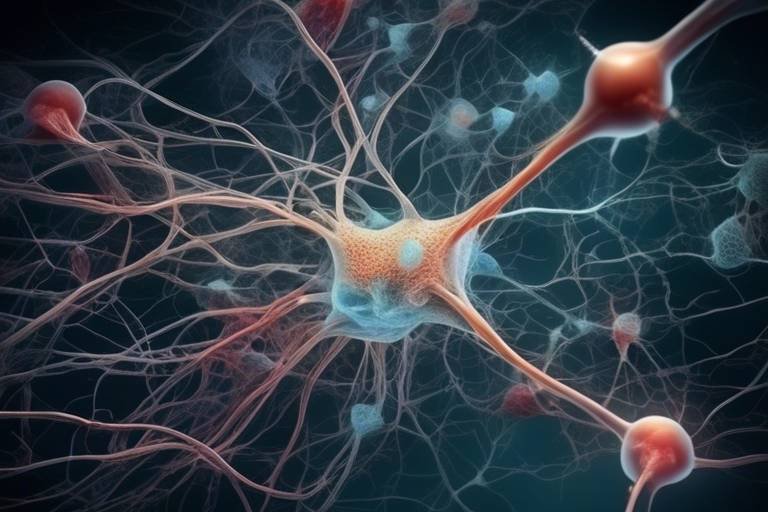Diving Into the Depths of Metaphysical Concepts
Have you ever found yourself gazing at the stars, pondering the vastness of the universe and your place within it? Or perhaps you've sat quietly, contemplating the essence of your own existence? These moments of introspection often lead us into the fascinating realm of metaphysics, a branch of philosophy that dives deep into the fundamental nature of reality, existence, and consciousness. In this article, we will embark on a journey through various metaphysical concepts, unraveling their meanings and implications while exploring how they shape our understanding of life and the universe.
Metaphysics isn't just a dusty old field of study; it's a vibrant tapestry woven from the threads of inquiry that have fascinated thinkers for centuries. From Aristotle to Kant, and from Descartes to contemporary philosophers, the questions posed by metaphysics have sparked debates and inspired countless theories. At its core, metaphysics seeks to answer some of the most profound questions we can ask: What is reality? What does it mean to exist? And how do our minds relate to our bodies? These inquiries might seem abstract, but they have real-world implications that affect how we perceive our lives and the universe around us.
As we navigate through this exploration, we’ll encounter a variety of perspectives that challenge our preconceptions and invite us to rethink our understanding of existence. Think of it as a philosophical adventure, where each concept we uncover is a stepping stone toward a deeper comprehension of our reality. Whether you're a seasoned philosopher or a curious novice, the insights gained from metaphysical exploration can enrich your worldview and provide a new lens through which to view life.
So, fasten your seatbelt and prepare for a thrilling ride through the depths of metaphysical concepts. We’ll delve into the nature of reality, existence, and the mind-body problem, examining how these ideas intersect with scientific theories and philosophical discourse. By the end of this journey, you may find yourself not only more informed but also more intrigued by the mysteries that lie at the heart of our existence.
- What is metaphysics? Metaphysics is a branch of philosophy that explores the fundamental nature of reality, existence, and the relationship between mind and matter.
- Why is metaphysics important? It helps us understand the underlying principles that govern our existence and challenges us to question our perceptions of reality.
- How does metaphysics relate to science? Metaphysics and science intersect in their pursuit of knowledge, with metaphysical concepts often informing scientific theories and vice versa.
- What are some key metaphysical questions? Key questions include: What is the nature of time? What is causality? What does it mean to exist?

The Nature of Reality
When we dive into the nature of reality, we often find ourselves standing at the crossroads of philosophy and perception. Reality isn't just a straightforward concept; it's a complex tapestry woven from the threads of our experiences, beliefs, and interpretations. At its core, metaphysics seeks to unravel the mysteries behind what is real and what is merely perceived. Have you ever wondered whether what you see is the same as what someone else sees? This question brings us to the distinction between subjective and objective realities.
Subjective reality is like a personal lens through which we view the world. It's shaped by our emotions, thoughts, and experiences. For instance, two friends can walk through the same park but come away with completely different impressions. One might be captivated by the vibrant colors of the flowers, while the other is preoccupied with the stress of their day. This divergence highlights how our individual perceptions can color our understanding of reality.
On the flip side, we have objective reality, which is often considered the "hard facts" of existence—things that remain constant regardless of personal perspectives. Think of it as the foundation upon which subjective experiences are built. For example, the existence of the park itself, with its trees and pathways, is an objective fact. Yet, how we engage with that park—whether we find it peaceful or chaotic—depends on our personal experiences and mental state.
Moreover, perception plays a crucial role in shaping our understanding of reality. It's not just about what we see; it's about how we interpret those sights. Imagine watching a movie: the same film can evoke laughter in one person and tears in another. This phenomenon illustrates that our individual backgrounds, emotions, and even cultural contexts can drastically alter our experience of reality. In essence, our mind acts as a filter, and the way we process information can lead us to vastly different conclusions about the same event.
To further explore the implications of these distinctions, let's consider a few key questions:
- How do our beliefs shape our perception of reality?
- Can two people ever truly understand each other's realities?
- What role does language play in defining our understanding of the world?
As we navigate through these questions, it's essential to recognize that both subjective and objective realities coexist. They are not mutually exclusive but rather interdependent. Our subjective experiences can inform our understanding of objective truths, while objective realities can influence how we perceive our surroundings. This interplay is vital in the realms of philosophy, psychology, and even science.
In conclusion, the nature of reality is a profound and intricate subject that invites us to question our assumptions and broaden our perspectives. By understanding the differences between subjective and objective realities, we can gain a deeper appreciation for the complexities of existence. As we continue this exploration of metaphysical concepts, let's keep in mind how our perceptions shape our understanding of the world around us.
- What is the difference between subjective and objective reality?
Subjective reality is based on personal experiences and perceptions, while objective reality refers to facts that exist independently of individual beliefs.
- Can reality be different for everyone?
Yes, reality can be perceived differently by individuals based on their backgrounds, emotions, and experiences.
- How does perception affect our understanding of reality?
Perception acts as a filter through which we interpret our experiences, leading to different conclusions about the same events.

Existence and Being
When we dive into the philosophical inquiries surrounding existence, we often find ourselves grappling with profound questions that challenge our very understanding of what it means to be. At its core, the exploration of existence and being is about more than just acknowledging that we are here; it's about unraveling the intricate tapestry of reality that encompasses our lives. What does it mean to exist? Is our existence merely a fleeting moment in the vast cosmos, or is there something more significant at play?
Philosophers have pondered these questions for centuries, leading to various theories that attempt to explain the essence of being. One might liken existence to a vast ocean, with each theory representing a different wave crashing against the shore of our understanding. Some waves are gentle and soothing, while others are tumultuous and challenging. As we navigate through these waters, we encounter different ontological perspectives that shape our grasp of existence.
Ontological perspectives serve as the foundation for our understanding of existence. They are like the lenses through which we view reality, each offering a unique interpretation of what it means to exist. Among the most prominent theories are realism, idealism, and existentialism. Each of these philosophies not only addresses the nature of existence but also reflects the values and assumptions of the cultures from which they emerged.
Let’s take a closer look at the fundamental differences between realism and idealism. Realism posits that there is an independent reality that exists outside of our perceptions. Think of it as a sturdy tree standing tall in a forest, regardless of whether anyone is there to witness it. In contrast, idealism suggests that reality is mentally constructed, much like a beautifully painted canvas created by an artist's imagination. This perspective raises intriguing questions about the nature of truth and reality—if reality is shaped by our thoughts, can we ever truly know what is real?
Then we have existentialism, a philosophy that emphasizes individual existence, freedom, and choice. Existentialists argue that our essence is not predetermined; rather, it is shaped by our actions and decisions. Imagine standing at a crossroads, with each path representing a choice that defines who you are. This philosophy invites us to take responsibility for our lives and to find meaning in our existence, even amidst the chaos of the world around us.
Understanding existence and being is not just an academic exercise; it has profound implications for how we live our lives. By grappling with these concepts, we can foster a deeper appreciation for our place in the universe and the connections we share with others. As we continue to explore these metaphysical questions, we uncover layers of meaning that enrich our understanding of reality.
- What is the difference between existence and being?
Existence refers to the state of being present or alive, while being encompasses the essence or nature of an entity. - How do different philosophies view existence?
Realism sees existence as independent of perception, idealism views it as mentally constructed, and existentialism emphasizes individual choice and freedom. - Why is understanding existence important?
Understanding existence helps us navigate our lives with purpose, making informed choices that reflect our values and beliefs.

be
Examining how metaphysics defines reality, this section discusses the distinction between subjective and objective realities and the role of perception in shaping our understanding.
When we ponder the concept of being, we often find ourselves standing at the crossroads of existence. What does it mean to ? This question has puzzled philosophers for centuries, and it remains a cornerstone of metaphysical inquiry. To is not merely to occupy space or time; it is to engage with the world in a meaningful way. It invites us to explore the essence of our existence and challenges us to reflect on the nature of our reality.
Here, we delve into various ontological theories, including realism, idealism, and existentialism, and how they shape our understanding of existence.
This subheading discusses the fundamental differences between realism, which posits an independent reality, and idealism, which suggests that reality is mentally constructed.
Exploring existentialism, we analyze how this philosophy emphasizes individual existence, freedom, and choice in defining meaning and essence.
This section highlights the central metaphysical questions, such as the nature of time, space, and causality, and their significance in philosophical discourse.
An exploration of the mind-body dualism, this section discusses the relationship between mental states and physical processes, and the implications for understanding consciousness.
Here, we compare dualistic perspectives, which separate mind and body, with physicalist views that argue for a unified understanding of consciousness.
This subheading examines how different approaches to the mind-body problem affect our understanding of consciousness and its place in the metaphysical framework.
This section discusses the interplay between metaphysical concepts and scientific theories, exploring how they inform and challenge each other in the quest for knowledge.
We delve into the philosophical foundations of scientific inquiry, examining how metaphysical assumptions influence scientific methodologies and interpretations.
This subheading explores the metaphysical questions raised by quantum mechanics, including the nature of reality at the subatomic level and the implications for causality.
- What is metaphysics? Metaphysics is a branch of philosophy that explores the fundamental nature of reality, including concepts such as being, existence, and the universe.
- How does metaphysics relate to science? Metaphysics and science are intertwined; metaphysical concepts often underpin scientific theories, influencing how we interpret empirical data.
- What is the mind-body problem? The mind-body problem examines the relationship between mental states and physical processes, questioning how consciousness interacts with the physical world.

and the implications of different theories of being.
When we talk about existence, we’re stepping into a vast ocean of philosophical inquiry. What does it truly mean to be? It’s a question that has puzzled thinkers for centuries, and different theories of being provide us with various lenses through which to explore this profound concept. At the heart of this exploration lies the distinction between ontological perspectives, which shape our understanding of existence and the implications that arise from these differing viewpoints.
To understand the implications of different theories of being, we first need to grasp what these theories propose. For instance, realism posits that an objective reality exists independent of our perceptions. This means that whether or not we are aware of it, the universe operates on its own terms, governed by laws and principles that remain constant. In stark contrast, idealism suggests that reality is fundamentally a mental construct. This perspective leads us to ponder: if our minds shape reality, what does that say about our experiences and interactions with the world around us?
Furthermore, existentialism adds another layer to this discussion by emphasizing the individual’s experience. It argues that existence precedes essence, meaning that we define our own purpose and identity through our choices and actions. This idea can be both liberating and daunting. Imagine standing at a crossroads, where every decision you make shapes your reality. The implications here are profound; they suggest that we have the power to influence not just our lives, but the very fabric of existence itself.
As we navigate through these theories, we can summarize their implications in a table:
| Theory | Core Idea | Implications |
|---|---|---|
| Realism | Reality exists independently of perception. | Encourages objective inquiry and scientific exploration. |
| Idealism | Reality is mentally constructed. | Focuses on subjective experiences and interpretations. |
| Existentialism | Existence precedes essence; individuals define their own meaning. | Empowers personal responsibility and freedom of choice. |
These theories not only shape our understanding of existence but also influence how we engage with the world. For example, if you lean towards realism, you might prioritize empirical evidence and scientific reasoning in your daily life. On the other hand, an idealist perspective might lead you to explore the power of thoughts and beliefs in shaping your reality. Meanwhile, existentialism might push you to seek authenticity and embrace the freedom that comes with self-definition.
Ultimately, the implications of these theories extend far beyond philosophical discourse; they affect our everyday decisions, relationships, and how we perceive our place in the universe. So, as we ponder what it means to be, we are also invited to reflect on the choices we make and the realities we construct. In this dynamic interplay of existence and being, we find not just answers, but questions that challenge us to think deeper and live more authentically.
- What is the difference between realism and idealism?
Realism asserts that reality exists independently of our perceptions, while idealism posits that reality is a mental construct shaped by our thoughts. - How does existentialism influence our understanding of existence?
Existentialism emphasizes individual freedom and the idea that we create our own meaning through our choices and experiences. - Why is the study of metaphysics important?
Metaphysics helps us explore fundamental questions about reality, existence, and the nature of being, which can influence our worldview and personal philosophies.

Ontological Perspectives
When we dive into the realm of ontology, we are essentially exploring the very fabric of existence itself. Ontology is a branch of metaphysics that deals with the nature of being, existence, and the categories of being. It's like peeling back the layers of an onion, revealing the complex structures that underlie our understanding of reality. Different ontological perspectives offer unique lenses through which we can examine what it means to exist. Let's take a closer look at some of these perspectives, including realism, idealism, and existentialism.
First up, we have realism. This perspective posits that there is an objective reality that exists independently of our perceptions. Think of it as a sturdy tree standing tall in a forest; whether you see it or not, it remains. Realists argue that the world is made up of entities that exist outside of our thoughts and beliefs. This viewpoint supports the idea that scientific inquiry can uncover truths about the universe, as these truths exist regardless of human experience.
In contrast, idealism presents a radically different view. It suggests that reality is fundamentally mental, and our perceptions shape the world around us. Imagine a painter creating a masterpiece; the canvas is blank until the artist brings it to life with strokes of color. Idealists argue that objects do not exist independently but are instead constructed by our minds. This perspective raises intriguing questions about the nature of reality and the extent to which our consciousness influences the world.
Then we have existentialism, which takes a more personal approach to ontology. This philosophy emphasizes individual existence, freedom, and choice. It’s like standing at a crossroads, where every decision you make shapes your path forward. Existentialists assert that existence precedes essence, meaning that we are not defined by predetermined categories but rather by our choices and actions. This perspective invites us to reflect on our own lives and the meaning we create through our experiences.
To summarize these ontological perspectives, we can create a simple table:
| Perspective | Key Idea |
|---|---|
| Realism | Objective reality exists independently of perception. |
| Idealism | Reality is mentally constructed and shaped by perception. |
| Existentialism | Existence precedes essence; individuals define their own meaning. |
As we navigate through these ontological perspectives, it becomes clear that each offers valuable insights into the nature of existence. They challenge us to ponder profound questions about reality, our place within it, and the essence of what it means to be. By engaging with these ideas, we not only deepen our understanding of philosophy but also enrich our personal journeys as we seek to comprehend the world around us.
- What is ontology? Ontology is the branch of metaphysics that studies the nature of being and existence.
- How does realism differ from idealism? Realism asserts that an objective reality exists independently of our perceptions, while idealism posits that reality is constructed by our minds.
- What role does existentialism play in ontology? Existentialism emphasizes individual existence and the freedom to create meaning through personal choices.

Realism vs. Idealism
When we dive into the philosophical waters of realism and idealism, we encounter two distinct perspectives that shape our understanding of reality. These two schools of thought are like two sides of a coin, each offering unique insights into the nature of existence. Realism posits that an independent reality exists outside of our perceptions, suggesting that the world is as it is, regardless of whether we observe it. On the other hand, idealism argues that reality is fundamentally constructed by our minds; it’s a tapestry woven from our thoughts, experiences, and perceptions.
To better grasp the distinctions between these two viewpoints, let’s explore some key differences:
| Aspect | Realism | Idealism |
|---|---|---|
| Nature of Reality | Independent of perception | Dependent on perception |
| Key Proponents | Aristotle, Bertrand Russell | Plato, George Berkeley |
| Philosophical Focus | Objective truths | Subjective experiences |
Imagine standing at the edge of a vast ocean. A realist would argue that the ocean exists, complete with its waves and currents, regardless of whether anyone is there to witness it. In contrast, an idealist might suggest that the ocean is merely a reflection of our thoughts and feelings about water, surf, and the beach. This metaphor highlights how these philosophies approach the concept of reality from different angles.
Furthermore, the implications of these philosophies extend beyond mere academic debate. They influence our everyday lives, shaping everything from how we perceive art and literature to how we understand science and morality. For instance, a realist might approach scientific inquiry with the belief that there are objective truths to be discovered, while an idealist may focus on how our interpretations of those truths are influenced by our subjective experiences.
In essence, the clash between realism and idealism is not just philosophical; it’s a fundamental part of the human experience. It challenges us to consider: Is reality something we can discover, or is it something we create? This question echoes through the halls of philosophy and resonates with anyone who has ever pondered the nature of existence.
As we navigate through these complex ideas, it becomes clear that both realism and idealism offer valuable perspectives. They serve as lenses through which we can examine our understanding of reality, reminding us that the world is both a tangible place and a canvas painted by our thoughts and perceptions.
- What is realism? Realism is the philosophical viewpoint that asserts the existence of an objective reality independent of our perceptions.
- What is idealism? Idealism is the belief that reality is mentally constructed and dependent on our perceptions and thoughts.
- How do realism and idealism affect our understanding of science? Realism supports the idea of objective truths in science, whereas idealism emphasizes the subjective interpretation of scientific findings.
- Can one philosophy be more valid than the other? This is a matter of debate; both philosophies offer valuable insights, and their relevance may vary depending on the context.

Existentialism's Take
Existentialism is a philosophical movement that dives deep into the essence of individual existence. It emphasizes that each person is responsible for giving their own life meaning, even in a world that often seems chaotic and indifferent. Think about it—how often do we find ourselves questioning our purpose? Existentialists argue that it's this very questioning that defines us. Unlike traditional philosophies that might suggest a predetermined essence or purpose, existentialism flips the script, asserting that existence precedes essence. In simpler terms, we first exist, and through our actions and choices, we create our essence.
This perspective brings a wave of empowerment but also a hefty burden. The idea that we are the architects of our own lives can be exhilarating. However, it also means we must confront the uncomfortable reality of freedom and responsibility. Imagine standing at a crossroads, with countless paths before you, each representing a different choice. The weight of that decision can be daunting. Existentialists like Jean-Paul Sartre famously stated, "We are condemned to be free," highlighting that while we are free to choose, we must also bear the consequences of those choices.
Moreover, existentialism delves into the notion of authenticity. It encourages individuals to live genuinely, aligning their actions with their true selves rather than conforming to societal expectations. This quest for authenticity can be likened to peeling an onion—each layer you shed reveals a deeper, more genuine self. But beware, as the deeper you go, the more tears you might shed! This journey is not for the faint-hearted; it requires introspection and courage to face the uncomfortable truths about oneself.
Existentialism also grapples with the concept of absurdity. Albert Camus, another key figure in this movement, suggested that life is inherently devoid of meaning, yet we continue to search for it. This paradox can lead to feelings of disillusionment, but instead of succumbing to despair, existentialists advocate for embracing the absurd. It's about finding joy in the journey, even when the destination seems uncertain. Just like a sailor navigating a stormy sea, we learn to steer our ship through life's unpredictability, finding our own way despite the chaos around us.
In summary, existentialism invites us to take a hard look at our lives and make conscious choices. It challenges us to embrace our freedom, confront our responsibilities, and seek authenticity in a world that often tries to dictate who we should be. So, the next time you find yourself at a crossroads, remember: the power lies within you to shape your own path. Embrace the existential adventure!
- What is existentialism? Existentialism is a philosophical movement that focuses on individual existence, freedom, and the search for meaning.
- Who are the main figures in existentialism? Key figures include Jean-Paul Sartre, Simone de Beauvoir, and Albert Camus, each contributing unique perspectives to the philosophy.
- How does existentialism view freedom? Existentialism sees freedom as both a gift and a burden, emphasizing that individuals are responsible for their choices and the meanings they create.
- What does 'existence precedes essence' mean? This phrase suggests that individuals first exist and then define their essence through actions and choices, rather than having a predetermined purpose.

Metaphysical Questions
When we dive into the vast ocean of metaphysics, we often find ourselves grappling with questions that seem to float just beneath the surface, waiting for us to explore their depths. These are not just academic musings; they are fundamental inquiries that challenge our understanding of reality and existence. They invite us to ponder the very fabric of our being and the universe we inhabit. What is the nature of reality? Does time truly exist, or is it merely a construct of our minds? And how do we define causality in a world that often feels chaotic? These questions, while complex, are essential in shaping our philosophical discourse.
One of the most intriguing aspects of metaphysical inquiry is the way it blurs the lines between science and philosophy. For instance, consider the question of time. Is it linear, as we often perceive it, or is it cyclical, echoing the patterns of nature? Philosophers like Aristotle and Kant have provided various interpretations, yet the debate continues. Similarly, the nature of space raises profound questions: Is space an entity in itself or merely a relational property of objects? This inquiry leads us to consider how our perception influences our understanding of these concepts.
Moreover, the question of causality remains a focal point in metaphysical discussions. Are events predetermined, or do we possess free will to shape our destinies? This dilemma has sparked countless debates among philosophers. Some argue for a deterministic universe, where every event is a result of preceding occurrences, while others champion the idea of free will, suggesting that we can influence our future through our choices. These contrasting views create a rich tapestry of thought that challenges us to reflect on our own beliefs and experiences.
In addition to these inquiries, the relationship between mind and matter poses another critical metaphysical question. Does consciousness arise from physical processes, or is it a separate entity? This leads us to consider the implications of dualism and physicalism, two competing theories that shape our understanding of the mind-body connection. The exploration of these questions not only enhances our philosophical perspective but also encourages us to examine our own existence and the nature of reality itself.
Ultimately, metaphysical questions serve as a gateway to deeper understanding. They compel us to confront the unknown and challenge our assumptions about the world. As we navigate through these inquiries, we may find that the answers are not as important as the journey itself. The act of questioning opens up new avenues of thought, allowing us to explore the profound mysteries of existence and our place within it. So, what do you think? Are you ready to dive deeper into the metaphysical waters?
- What is metaphysics? Metaphysics is a branch of philosophy that explores the fundamental nature of reality, including concepts such as being, existence, and the universe.
- What are some common metaphysical questions? Common metaphysical questions include inquiries about the nature of time, space, causality, and the relationship between mind and body.
- How does metaphysics relate to science? Metaphysics and science intersect in their exploration of reality, with metaphysical concepts often influencing scientific theories and methodologies.
- Why are metaphysical questions important? These questions challenge our understanding of existence and encourage deeper philosophical inquiry, ultimately enriching our perspective on life and the universe.

The Mind-Body Problem
The mind-body problem is one of the most intriguing and perplexing issues in philosophy. It raises fundamental questions about the relationship between our mental states—like thoughts, emotions, and consciousness—and our physical bodies. Imagine for a moment that your mind is like a conductor, orchestrating a symphony of physical actions performed by your body. But what if the conductor is entirely separate from the musicians? This metaphor captures the essence of the mind-body problem, which grapples with how two seemingly different entities can interact and influence one another.
At the heart of this philosophical debate lies the concept of dualism, most famously championed by René Descartes. Dualism posits that the mind and body are distinct substances; the mind is non-physical and the body is physical. This raises intriguing questions: How can something non-physical interact with something physical? Can our thoughts really influence our actions, or are they merely byproducts of biological processes? On the other side of the spectrum, we have physicalism, which argues that everything about the mind can be explained in terms of physical processes in the brain. This perspective suggests that consciousness is merely an emergent property of complex neural interactions, much like how a whirlpool emerges from swirling water.
To further understand this intricate relationship, let’s break down the key perspectives:
- Dualism: The belief that mind and body are fundamentally different in nature.
- Physicalism: The idea that everything about the mind can ultimately be explained by physical processes.
- Interactionism: A form of dualism that suggests the mind can affect the body and vice versa.
- Epiphenomenalism: The view that physical processes can cause mental states, but mental states cannot cause physical actions.
As we dive deeper into the implications of these theories, we find ourselves pondering the nature of consciousness itself. What does it mean to be conscious? Are we simply complex biological machines, or is there something more profound at play? The implications of our understanding—or misunderstanding—of the mind-body relationship extend far beyond academic philosophy. They touch on ethics, psychology, and even artificial intelligence. If we can’t fully grasp how our minds and bodies interact, how can we build machines that think or feel like us?
Moreover, the mind-body problem has practical implications for fields such as psychology and neuroscience. For instance, when someone experiences a mental health issue, is it a result of a chemical imbalance in the brain, or does it stem from unresolved emotional conflicts? Understanding the mind-body relationship can lead to more effective treatments and therapies. It’s a bit like troubleshooting a car: if you only fix the engine without considering the electrical system, you might not get to the root of the problem.
In summary, the mind-body problem is not just an abstract philosophical debate; it’s a vital inquiry that shapes our understanding of ourselves and the world around us. Whether we lean towards dualism or physicalism, the questions raised by this issue compel us to explore the depths of human experience and existence.
- What is the mind-body problem? The mind-body problem explores the relationship between mental states and physical processes, questioning how they interact.
- What are the main theories regarding the mind-body relationship? The main theories include dualism, physicalism, interactionism, and epiphenomenalism.
- Why is the mind-body problem important? It has implications for understanding consciousness, mental health, and the development of artificial intelligence.

Dualism vs. Physicalism
When we dive into the philosophical waters of the mind-body problem, dualism and physicalism stand as two towering giants, each offering a unique lens through which to view the relationship between our mental states and the physical world. At its core, dualism posits that the mind and body are fundamentally different substances. Imagine a two-story building: the upper floor represents the mind, ethereal and intangible, while the ground floor symbolizes the physical body, solid and observable. This separation leads to a myriad of questions about how these two realms interact. If the mind is non-physical, how does it influence the physical body? This is where dualists like René Descartes come into play, advocating for the idea that the mind, or soul, exists independently of the body, suggesting a mysterious interaction between the two.
On the flip side, we have physicalism, which asserts that everything about the mind can be explained in terms of physical processes. Think of it as a complex machine: every thought, feeling, and experience can be traced back to specific brain activities and neural connections. Physicalists argue that what we perceive as consciousness is merely the result of biochemical reactions and electrical impulses within our brains. This perspective aligns with the scientific approach, emphasizing that understanding the brain's workings can ultimately unravel the mysteries of the mind.
To illustrate the differences between dualism and physicalism, consider the following table:
| Aspect | Dualism | Physicalism |
|---|---|---|
| Nature of Mind | Non-physical substance | Physical processes |
| Interaction | Mind influences body | Mind is a product of the body |
| Philosophical Roots | Descartes, Plato | Contemporary science |
| Key Questions | How do mind and body interact? | What brain processes correlate with mental states? |
Both perspectives have their strengths and weaknesses. Dualism allows for the possibility of an afterlife or existence beyond physical death, which can be comforting for many. However, it struggles to explain the mechanisms of interaction between mind and body. Physicalism, while grounded in observable science, raises questions about the subjective nature of experience—can a purely physical explanation truly account for the richness of human consciousness? This ongoing debate is not just academic; it has profound implications for fields as diverse as psychology, neuroscience, and even artificial intelligence.
In conclusion, the dualism vs. physicalism debate invites us to reflect on our own beliefs about consciousness and existence. Are we merely the sum of our physical parts, or is there something more profound at play? As we continue to explore these questions, we may find that the answers are as complex and layered as the human experience itself.
- What is dualism? Dualism is the philosophical view that the mind and body are distinct entities, with the mind being non-physical.
- What is physicalism? Physicalism is the belief that everything about the mind can be explained by physical processes in the brain.
- How do dualism and physicalism differ? Dualism posits a separation between mind and body, while physicalism asserts that mental states are entirely dependent on physical processes.
- Can consciousness exist without a physical body? This question is central to the dualism debate, with dualists arguing that consciousness can exist independently, while physicalists disagree.

Implications for Consciousness
When we dive into the mind-body problem, we uncover layers of complexity that challenge our understanding of consciousness itself. The relationship between mental states and physical processes raises a myriad of questions: Is consciousness merely a byproduct of brain activity, or does it exist independently of the physical realm? These inquiries are not just academic; they have profound implications for how we perceive our own existence and the nature of reality.
To grasp the implications for consciousness, it's essential to consider the two dominant perspectives: dualism and physicalism. Dualists argue that the mind and body are distinct entities, suggesting that mental phenomena cannot be fully explained by physical processes alone. This perspective opens the door to the idea that consciousness might transcend the physical realm, leading us to ponder questions about the soul, the afterlife, or even the possibility of consciousness existing in a non-physical form.
On the other hand, physicalists contend that everything about consciousness can be understood through the lens of physical processes in the brain. This view implies that consciousness is entirely dependent on the physical state of the brain, leading to a more mechanistic understanding of human experience. If consciousness is purely a product of neural activity, what does that say about free will, personal identity, and the essence of being human? Are we merely intricate biological machines, or is there something more to our existence?
Moreover, the implications extend beyond philosophical musings into practical realms, such as psychology and neuroscience. Understanding consciousness can influence therapeutic practices, inform our approach to mental health, and even shape our legal and ethical frameworks regarding responsibility and agency. For instance, if consciousness is viewed as a separate entity from the physical body, it raises questions about accountability in cases involving mental illness or neurological disorders.
To encapsulate the core implications of different perspectives on consciousness, consider the following table:
| Perspective | Implications for Consciousness |
|---|---|
| Dualism |
|
| Physicalism |
|
As we navigate these philosophical waters, we must acknowledge that the implications for consciousness are not merely theoretical; they resonate deeply with our lived experiences. Whether we lean towards dualism or physicalism, the quest to understand consciousness is a journey that reveals the very essence of what it means to be human. It invites us to reflect on our thoughts, emotions, and the intricate tapestry of our existence. So, as we ponder these profound questions, we might ask ourselves: What does it truly mean to be aware? And how do our beliefs about consciousness shape our reality?
- What is the mind-body problem?
The mind-body problem addresses the relationship between mental states (thoughts, emotions) and physical processes (brain activity). - What are the main perspectives on consciousness?
The two main perspectives are dualism, which posits a separation between mind and body, and physicalism, which argues that consciousness is a product of physical processes. - How do these perspectives impact our understanding of free will?
Dualism may allow for more freedom in choice, while physicalism suggests our choices are determined by biological processes. - What are the implications for mental health?
Understanding consciousness can influence treatment approaches and how we perceive mental illness and responsibility.

Metaphysics and Science
When we think about metaphysics and its relationship with science, it's like peering into a vast ocean of questions that ripple through our understanding of the universe. At first glance, these two fields might seem like oil and water—distinct and separate. However, dive a little deeper, and you'll find that they are intricately intertwined, each influencing the other in profound ways. Metaphysics lays the philosophical groundwork that underpins scientific inquiry, while scientific discoveries often challenge and refine our metaphysical assumptions.
One of the key areas where metaphysics intersects with science is in the realm of causality. Scientists often seek to understand the 'how' and 'why' of phenomena, but these questions are fundamentally metaphysical. For instance, when physicists explore the laws of nature, they are not just cataloging observations; they are making metaphysical claims about the structure of reality itself. This relationship becomes particularly evident in the field of quantum mechanics, where the behavior of particles at the subatomic level raises questions that challenge our traditional notions of causality and existence.
Moreover, the philosophy of science plays a crucial role in shaping our understanding of scientific methodologies. What are the assumptions we make when we conduct experiments? What constitutes a valid explanation? These are not merely scientific questions; they are deeply philosophical ones. The interplay between metaphysical assumptions and scientific practice can be illustrated through the following table:
| Metaphysical Concept | Scientific Implication |
|---|---|
| Causality | Understanding the relationship between cause and effect in experiments. |
| Realism | The belief that the universe exists independently of our observations. |
| Materialism | The assumption that everything is made of matter and can be studied scientifically. |
| Determinism | The idea that all events are determined by preceding events and conditions. |
As we unravel the complexities of the universe, we must grapple with the metaphysical implications of our scientific findings. For example, the bizarre phenomena of quantum entanglement suggest that particles can be interconnected in ways that defy classical logic. This leads to profound questions: Is reality fundamentally interconnected? Does our perception play a role in shaping what we observe? These inquiries push the boundaries of both science and metaphysics, inviting us to reconsider our understanding of existence.
Furthermore, the advancements in science often lead to a reevaluation of metaphysical beliefs. When Einstein proposed his theory of relativity, it revolutionized our understanding of time and space, prompting philosophers to rethink the metaphysical implications of these concepts. Similarly, as we continue to explore the universe through the lens of modern physics, we find ourselves at the crossroads of science and metaphysics, where each discipline informs and enriches the other.
In conclusion, the relationship between is not just an academic curiosity; it is a dynamic interplay that shapes our quest for knowledge. As we continue to explore the mysteries of the universe, we must remain open to the philosophical questions that arise, for they are the very essence of what it means to seek understanding in an ever-complex world.
- What is the main difference between metaphysics and science?
Metaphysics deals with the fundamental nature of reality and existence, while science focuses on empirical observation and experimentation to understand the physical world. - How does quantum mechanics challenge metaphysical assumptions?
Quantum mechanics introduces concepts such as entanglement and superposition, which challenge traditional notions of causality and the independence of objects. - Can metaphysical beliefs influence scientific inquiry?
Yes, metaphysical assumptions often underpin scientific methodologies and interpretations, shaping the questions scientists ask and the conclusions they draw.

Philosophy of Science
The serves as a bridge between the abstract world of metaphysical concepts and the tangible realm of scientific inquiry. It raises critical questions about the foundations of scientific knowledge, the methods employed in research, and the implications of scientific discoveries on our understanding of reality. At its core, the philosophy of science examines how we know what we know, challenging us to consider the assumptions that underlie scientific practices. Have you ever wondered why certain theories are accepted while others are dismissed? This is where the philosophy of science comes into play, prompting us to question the very nature of scientific truth.
One of the key aspects of this field is the examination of scientific methodologies. Scientists often rely on a systematic approach to gather and analyze data, yet the philosophical implications of these methods can be profound. For instance, the distinction between inductive and deductive reasoning is crucial. Inductive reasoning involves drawing general conclusions from specific observations, while deductive reasoning starts with general principles to predict specific outcomes. Understanding these methodologies helps clarify how scientific theories are formulated and tested.
Moreover, the philosophy of science delves into the role of metaphysical assumptions in scientific inquiry. Every scientific theory is built upon certain assumptions about the world. For example, the assumption that the laws of nature are uniform across time and space is foundational to scientific exploration. Without these metaphysical underpinnings, the very fabric of scientific inquiry would unravel. This interplay between science and metaphysics raises intriguing questions: What happens when scientific discoveries challenge established metaphysical beliefs? How do we reconcile conflicting theories?
To illustrate these points, consider the following table that summarizes key philosophical positions in the philosophy of science:
| Philosophical Position | Description | Implications for Science |
|---|---|---|
| Empiricism | Knowledge is derived from sensory experience. | Scientific theories must be testable and observable. |
| Rationalism | Knowledge is gained through reason and logical deduction. | Theoretical frameworks can guide scientific inquiry. |
| Pragmatism | Truth is determined by practical consequences and usefulness. | Scientific theories are evaluated based on their applicability. |
As we navigate through the complexities of scientific thought, we must also consider the ethical implications of scientific advancements. The philosophy of science doesn't just stop at understanding methodologies; it extends into the realm of ethics, questioning how scientific knowledge should be used. For instance, the development of technologies like genetic engineering raises ethical dilemmas that challenge our moral frameworks. Should we use our scientific knowledge to alter life itself? These questions highlight the necessity of philosophical inquiry in guiding the responsible application of science.
In conclusion, the philosophy of science is not merely an academic exercise; it is a vital component of our understanding of reality. By questioning the foundations of scientific knowledge and exploring the implications of scientific discoveries, we gain deeper insights into both the universe and ourselves. So, the next time you ponder a scientific theory, take a moment to reflect on the philosophical questions that accompany it. Are we merely observers of reality, or are we active participants in shaping it?
- What is the philosophy of science? It is a branch of philosophy that examines the foundations, methods, and implications of science.
- Why is the philosophy of science important? It helps us understand the assumptions behind scientific inquiry and the ethical implications of scientific advancements.
- How does metaphysics relate to science? Metaphysics provides the foundational beliefs that inform scientific theories and methodologies.

Metaphysical Implications of Quantum Mechanics
Quantum mechanics, often seen as the cornerstone of modern physics, challenges our conventional understanding of reality in profound ways. At the heart of this discipline lies a set of principles that not only describe the behavior of particles at the subatomic level but also raise intriguing metaphysical questions. For instance, the concept of superposition suggests that particles can exist in multiple states simultaneously until observed. This phenomenon leads us to ponder: what does it mean for reality to be dependent on observation? Could it be that our very act of perceiving the universe shapes it in ways we are only beginning to understand?
Additionally, the principle of entanglement introduces a level of interconnectedness that defies classical notions of separateness. When two particles become entangled, the state of one instantly influences the state of another, regardless of the distance separating them. This raises questions about the nature of causality and the limits of our understanding of space and time. Are these particles merely components of a larger, unified reality, or do they suggest that our traditional metaphysical frameworks are inadequate?
Moreover, the observer effect—whereby the act of measuring a quantum system alters its state—compels us to reconsider the role of consciousness in the fabric of reality. Some theorists suggest that consciousness itself may play a pivotal role in the manifestation of reality, hinting at a metaphysical landscape where the mind and matter are intricately intertwined. This leads to a fascinating intersection between philosophy and science, as we explore how our cognitive frameworks influence our understanding of the universe.
To further illustrate these points, consider the following table that summarizes key metaphysical implications of quantum mechanics:
| Quantum Principle | Metaphysical Implication |
|---|---|
| Superposition | Reality may depend on observation, suggesting a fluid nature of existence. |
| Entanglement | Challenges the notion of separateness, implying a fundamental interconnectedness. |
| Observer Effect | Highlights the potential role of consciousness in shaping reality. |
In summary, the implications of quantum mechanics extend far beyond the realm of physics, inviting us to rethink our metaphysical assumptions about reality, existence, and consciousness. As we delve deeper into these questions, we may uncover a more intricate tapestry of existence that challenges our perceptions and expands our understanding of what it means to be.
- What is quantum mechanics? Quantum mechanics is a fundamental theory in physics that describes the physical properties of nature at the scale of atoms and subatomic particles.
- How does quantum mechanics challenge traditional metaphysics? It questions the nature of reality, suggesting that observation can influence the state of a system, thus blurring the lines between observer and observed.
- What is the observer effect? The observer effect refers to changes that the act of observation can make on a phenomenon being observed, particularly in quantum mechanics.
- What is entanglement? Entanglement is a quantum phenomenon where particles become interconnected such that the state of one particle instantly affects the state of another, no matter the distance apart.
Frequently Asked Questions
-
What is metaphysics?
Metaphysics is a branch of philosophy that explores the fundamental nature of reality, existence, and the relationships between objects and their properties. It delves into questions that go beyond the physical sciences, examining concepts such as being, time, space, and causality.
-
How does metaphysics define reality?
Metaphysics distinguishes between subjective and objective realities. Subjective reality is shaped by individual perceptions and experiences, while objective reality exists independently of our thoughts and beliefs. This interplay raises questions about how we understand and interpret the world around us.
-
What are the main ontological perspectives?
There are several key ontological theories, including realism, idealism, and existentialism. Realism asserts that an independent reality exists, while idealism posits that reality is mentally constructed. Existentialism focuses on individual existence, freedom, and the quest for meaning.
-
What is the mind-body problem?
The mind-body problem addresses the relationship between mental states and physical processes. It raises questions about whether the mind and body are distinct entities (dualism) or if they are part of a unified whole (physicalism), significantly impacting our understanding of consciousness.
-
How does metaphysics relate to science?
Metaphysics and science often intersect, with metaphysical concepts influencing scientific methodologies and interpretations. For instance, the philosophical foundations of scientific inquiry can shape how we approach and understand scientific theories, including those in quantum mechanics.
-
What are the metaphysical implications of quantum mechanics?
Quantum mechanics raises intriguing metaphysical questions about the nature of reality at the subatomic level. It challenges traditional notions of causality and suggests that the act of observation can influence outcomes, leading to debates about the nature of existence and the role of the observer.
-
Why are metaphysical questions important?
Metaphysical questions are crucial because they help us explore the underlying principles that govern our understanding of reality and existence. By grappling with these questions, we can gain deeper insights into our place in the universe and the nature of our experiences.


















